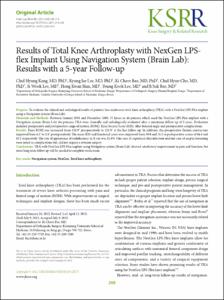KUMEL Repository
1. Journal Papers (연구논문)
1. School of Medicine (의과대학)
Dept. of Orthopedic Surgery (정형외과학)
Results of Total Knee Arthroplasty with NexGen LPS-flex Implant Using Navigation System (Brain Lab): Results with a 5-year Follow-up
- Keimyung Author(s)
- Kang, Chul Hyung; Lee, Kyung Jae; Bae, Ki Cheor; Cho, Chul Hyun; Lee, Si Wook
- Department
- Dept. of Orthopedic Surgery (정형외과학)
- Journal Title
- Knee Surgery and Related Research
- Issued Date
- 2012
- Volume
- 24
- Issue
- 4
- Keyword
- Navigation system; NexGen; Total knee arthroplasty
- Abstract
- Purpose: To evaluate the clinical and radiological results of patients that underwent total knee arthroplasty (TKA) with a NexGen LPS-Flex implant using a Navigation system (Brain Lab).
Materials and Methods: Between January 2001 and December 2005, 55 knees in 46 patients which used the NexGen LPS-Flex implant with a Navigation system (Brain Lab) for primary TKA were clinically and radiologically evaluated after a minimum follow-up of 5 years. Evaluation included preoperative and postoperative range of motion (ROM), Knee Society Score (KSS), tibio-femoral angle and postoperative complications.
Results: Knee ROM was increased from 118.9o preoperatively to 126.9o at the last follow up. In addition, the preoperative flexion contracture improved from 6.5o to 1.8o postoperatively. The mean KSS and functional score were improved from 59.8 and 51.2 to postoperative scores of 86.4 and 85.2 respectively. The rate of appearance of radiolucency in X-ray was 21.8%. One case of superficial skin infection and one case of aseptic loosening were noted as complications but, did not require a revision surgery.
Conclusions: TKA with NexGen LPS-Flex implant using Navigation system (Brain Lab) showed satisfactory improvement in pain and function, but more long term follow up will be needed to complete verification.
- Publisher
- School of Medicine
- Citation
- Chul Hyung Kang et al. (2012). Results of Total Knee Arthroplasty with NexGen LPS-flex Implant Using Navigation System (Brain Lab): Results with a 5-year Follow-up. Knee Surgery and Related Research, 24(4), 208–213. doi: 10.5792/ksrr.2012.24.4.208
- Type
- Article
- ISSN
- 2234-0726
- Appears in Collections:
- 1. School of Medicine (의과대학) > Dept. of Orthopedic Surgery (정형외과학)
- 파일 목록
-
-
Download
 oak-aaa-2331.pdf
기타 데이터 / 396.19 kB / Adobe PDF
oak-aaa-2331.pdf
기타 데이터 / 396.19 kB / Adobe PDF
-
Items in Repository are protected by copyright, with all rights reserved, unless otherwise indicated.